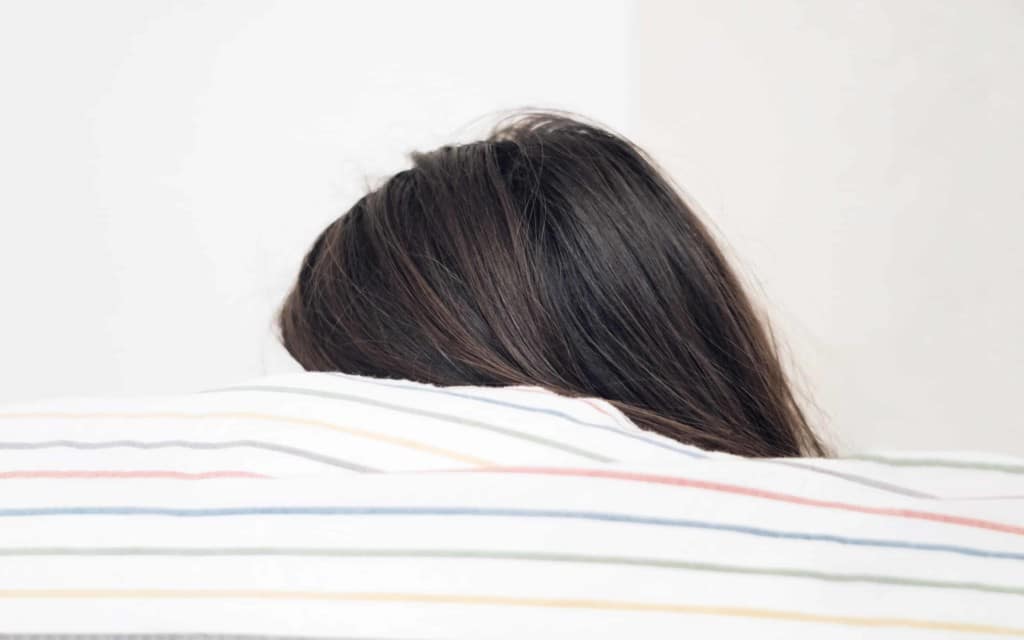Ready for a natural solution to your sleeping problems?
Although it’s hard to know for certain if any herbal strategy will eliminate disorders like insomnia and sleep anxiety completely, scientists are increasingly discovering the benefits of solutions like valerian.
These organic, herbal remedies provide a safer alternative to over-the-counter and prescription medications.
Valerian root is often referred to as “nature’s valium,” thanks to its unique impact on the nervous system and our sleeping patterns.
Since the days of ancient Rome and Greece, the valerian flower has been a therapeutic method for overcoming things like nervousness, insomnia, anxiety, and headaches.
If you want to learn more about valerian and how it works for sleep, check out our complete guide to valerian for insomnia.
If you’re looking for a guide on how to use insomnia and reap the best rewards, read on.

How to use valerian: The basics of valerian for insomnia
We know that plants help us to sleep in a myriad of ways.
Having a beautifully-scented bouquet on your bedside table might help you drift off into a deeper slumber thanks to the aromatherapy. Plants can even better bedroom air hygiene.
However, consuming certain plants—or more accurately their roots—can have a huge impact too.
Valerian plant is one of the most useful plants for insomnia on the market today. This perennial plant grows across Europe, Asia, and North America. Therefore it should be relatively easy to find wherever you are.
While research into how valerian works for sleep is still ongoing, studies indicate that the impact of this substance might have something to do with its interactions with the GABA receptors in the brain.
GABA, or gamma aminobutyric acid, contributes to the calmness and relaxation you feel in your body and mind. Common prescription drugs for anxiety typically work by increasing GABA levels in the brain.
Studies also indicate that valerian may be effective at reducing the amount of time it takes to fall asleep, while simultaneously improving sleep quantity and quality too.
One study into adults with insomnia discovered that a dose of valerian root helped the participants to fall into deep phase sleep 36% faster, while the time they spent in deep sleep increased within 14 days of taking the root.

Who is valerian root best for?
As with all treatments for insomnia, it’s worth noting that valerian might not be the right solution for everyone. While some people will benefit from this treatment, others won’t.
For instance, in one study from 2009, women with insomnia took 300mg of valerian extract 30 minutes before going to bed and reported no significant improvements into the quality of their sleep.
However, other research indicates that valerian can be useful. A National Institutes of Health report suggests that taking 400mg of valerian root extract significantly improved sleep compared to a placebo in 128 healthy participants.
Before we continue check out these great products on Amazon.
There is some evidence that valerian for insomnia may be particularly useful for adults who are having trouble with sleep disorders because they’re experiencing withdrawal symptoms after taking sedative medications.
If you’ve been reliant on benzodiazepines for a while and you’re trying to manage your sleeping patterns without prescription medication, valerian can help.
In one study of people experiencing withdrawal symptoms related to stopping the use of benzodiazepines after long-term use, significant improvements in the quality of sleep were reported within 2 weeks of valerian use.
Additionally, while most studies into how to take valerian for sleep have been conducted with adults, there are a few studies that indicate the plant may also be beneficial for children.
One study into children indicated that those taking valerian could get better total sleep time and improved quality of sleep over the course of 8 weeks.
Though valerian root is generally regarded as a very safe and risk-free solution for insomnia, it shouldn’t be taken by women who are nursing or pregnant at this time.
The risk to developing babies in a mother’s womb hasn’t been fully assessed yet. Additionally, it’s not safe to give valerian root to children younger than 3 years old.

Valerian root dosage for sleep
Insomnia is a problem that affects around one-third of all adults at some point during their lives. This common sleeping disorder has a profound impact on your quality of life and wellbeing. It’s no wonder people turn to herbal supplements and over-the-counter medications in search of a solution.
Unfortunately, although valerian has a lot of benefits to offer for people who experience sleeping issues, there’s no one-size-fits-all strategy when it comes to dosage.
As with most natural remedies, you may need to do some experimenting before you find the dose that’s most safe and effective for you.
Based on the available research, it seems likely that taking around 300mg to 600mg of valerian root before bedtime is a good idea.
Valerian tincture
The method of delivery you use for your valerian dosage for insomnia will also affect how much you need to take. For instance, if you’re taking valerian drops for sleep, then you’ll probably need to mix these with water to get the right results.
Valerian root tincture is the active constituents of the plant valeriana officinalis extracted into ethanol (medical alcohol). Valerian tincture can be added to water or fruit juice.
Adults can use anywhere between 10 and 50 drops of valerian in a bottle of water depending on the tincture’s strength. 20 drops from the glass dropper equals approximately 1ml. For instance, take 2-6ml in the night or as directed by your herbal practitioner.
Valerian tea
Although commercially sold as valerian tea it may contain a range of different herbs, the primary ingredient is usually valerian though. Not all valerian tea benefits are supported by strong scientific evidence.
The plant is famous for its distinct smell that many describe as similar to dirty socks. Many describe the taste of valerian tea as quite woodsy. The plant grows well in moist, grassy areas so the tea has an earthy quality that is distinctive.
If you’re using valerian in tea form for your sleeping issues, you’ll need to soak around 2 or 3 grams of dried root in a cup of hot water for some minutes before you go to bed. The longer you brew valerian tea, the more intense the taste will be.
Try about one tablespoon of loose tea leaves in a teacup. Let tea leaves steep for as long as desired. Some drinkers prefer a lighter tea, so a two-minute steep is sufficient. A 3-5 minute steep will brew a stronger cup of tea that provides more intense effects.
Tea experts often recommend you combine valerian tea with other ingredients to hide the the taste a bit. You may want to add milk or honey to sweeten the flavor. Some people also add mint or calming chamomile.
Valerian essential oil
Valerian essential oil is obtained by directing steam through the underground parts of the valerian plant. Herbal medicines containing valerian essential oil are usually available in liquid forms to be diffused, used topically or as bath additives.
Since 2016 The European Medicines Agency fully approves the usage of valerian essential oil for sleep and anxiety.
Valerian essential oil can be used for aromatherapy in a diffuser, use as many drops as you see fit. Valerian essential oil’s earthy scent pairs divinely with many other oils. Diffuse your favorite Valerian-infused blend to start the chill.
Drip the Valerian plant essential oil directly in your evening bath or treat yourself to a soothing massage with the oil after a long day at work. Valerian’s grounding aroma is perfect for relaxing while you massage sore muscles, achy feet, or a tight neck.
Other uses for valerian root
Valerian root also seems to be working on stomach aches, menstrual cramps and maybe menopausal symptoms.
If you’re taking valerian root to manage the anxiety or stress you feel before you go to bed at night, then it might be a good idea to take a slightly different dose. For anxiety, the average dose is around 200mg or 2 ml tincture taken three times per day.
This recommended dose is a little lower than the dosage for insomnia. That’s because high doses of valerian taken during the day may increase your chances of feeling sleepy.
Valerian root seems to work best after you’ve been taking it for an extended period. In most cases, you’ll need to take the same valerian root dosage for at least fourteen days before the effects fully kick in. However, don’t take this substance for more than a month without speaking to your doctor first.
No matter what kind of valerian root substance you’re taking, make sure that you read through the instructions provided on the packaging. If a recommended dose is provided for you, then it’s often best to stick to that, unless a doctor has given you an alternative suggestion.
All products are different, so it’s best to follow the information provided, so you don’t get an overly excessive concentration of your sleeping herb.

When to take valerian as part of your bedtime routine
When it comes to figuring out how to take valerian for sleep, there are a lot of factors you’ll need to figure out through simple trial and error. The best time to take a valerian root dosage for sleep is anywhere between 30 minutes and 2 hours before you go bed. There’s a lot of room for experimentation there.
After you take valerian, the unique substances and enzymes within the plant will work by binding to your GABA receptors. This should help you to feel calmer and more prepared for sleep.
The drowsiness caused by valerian root grows stronger over time, so the chances are that you’ll feel more sleepy after an hour than you would after 30 minutes. If you only need a slight nudge to get you to sleep, then you probably won’t need to take your valerian root too long before you go to bed.
According to one clinical trial into valerian root’s effectiveness for insomnia, GABA significantly decreases beta waves and increases alpha waves.
This is crucial to helping you drift off into a restful state of sleep. The findings revealed that valerian had the most significant impact on brainwaves after 60 minutes from administration.
Speak to your doctor or an herbal expert about taking valerian before you get started. Because most adult studies into this root have found that it’s more effective over an extended period. Researchers will often recommend using valerian root for at least a few weeks before you give up on it ultimately.
As with many sleep-focused treatments, valerian can also be more effective when it’s used as part of a regular bedtime routine. If you start to practice a schedule of doing the same activities before you go to bed each night.
Brushing your teeth, having a bath, and taking your valerian drops. Then the flavour of the drops, and even the act of taking them will begin to tell your mind that it’s time to go to sleep.

Valerian root side effects
As mentioned above, valerian root is generally a very safe substance for most people to take when it comes to eliminating issues like insomnia.
However, just like any other treatment, it’s worth noting that valerian can occasionally cause some side effects. Different people respond to herbs, chemicals, and other substances in unique ways.
Some of the (often mild) valerian root side effects that you might experience when you begin using this treatment include:
- Headaches
- Dizziness
- Restlessness
- Stomach upset
Since valerian root is intended to be a sleep aid, there’s also a good chance that it will make you feel drowsy regardless of when you take it. With that in mind, it’s important not to drive or operate any machinery after taking your nightly dose of valerian.
Before you begin taking valerian for insomnia, make sure that you check that the treatment is safe with your doctor.
It’s not a good idea to combine valerian root with certain medications, including antidepressants and sleeping pills. Most experts will also recommend not using valerian root at the same time as sedative drugs like secobarbital and phenobarbital.

Where to buy valerian root for insomnia
While there’s no guarantee valerian root will transform your sleeping patterns a, it is a relatively safe solution for many people. Please see below this article for recommended products to purchase.
If you’re looking for a natural and pain-free way to deal with problems like nighttime anxiety, and a perpetual inability to drift off to sleep, then valerian could be the perfect solution.
It’s important to acknowledge the limitations of valerian root as a sleep solution before you get started. Herbal remedies might be a good treatment option for some people, but they won’t always be the answer for every type of insomnia.
If your sleeping disorders are caused by things like perpetual night terrors, or you’re dealing with a physical condition like sleep apnea, then valerian might not be the right way to treat your condition.
Just make sure that you check with a professional how to take valerian for sleep before you begin. Speaking to your doctor about your options when it comes to valerian root will help you to avoid any dangerous side effects and reduce your risk of adverse drug interactions.
It’s also worth taking the time to do some research into the leading providers of valerian based sleep aids on the market. There are many different ways that you can take valerian today, from supplement pills to powders, tinctures, and teas.
Siestio. Sleep Matters.
General advice disclaimer
This article contains general tips and advice. However, no diet or exercise program should be started without consulting your physician or other industry professional first. For more information read our full disclaimer here.








